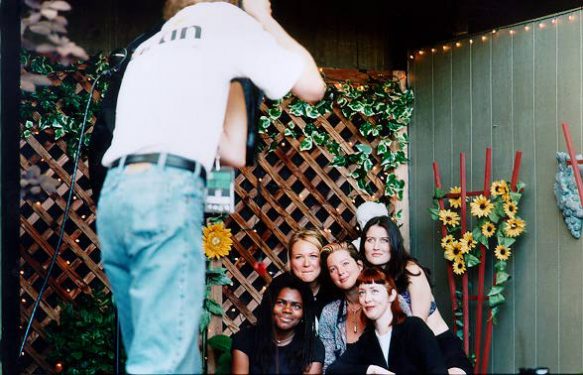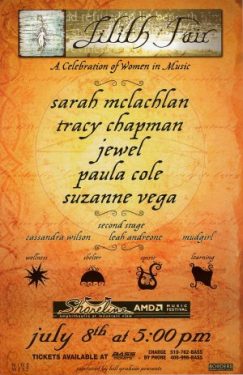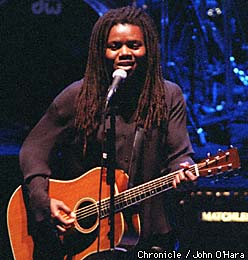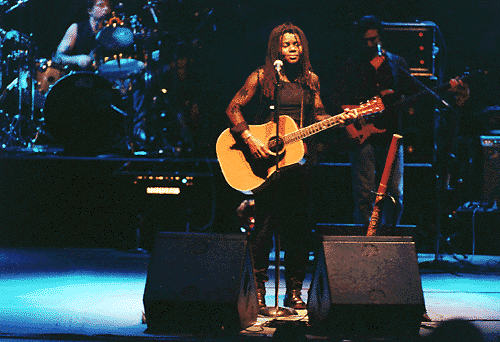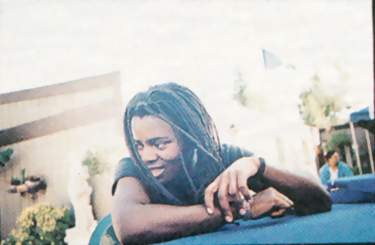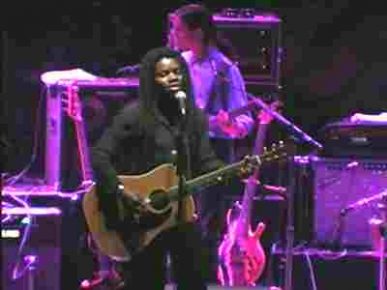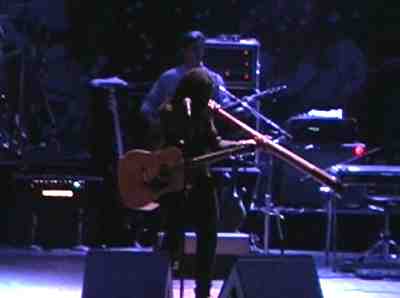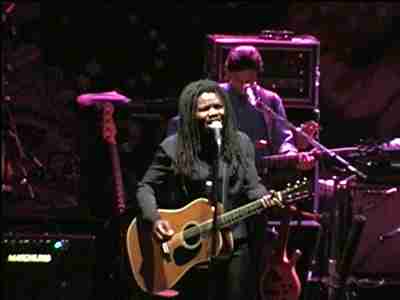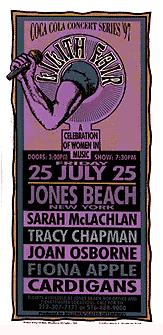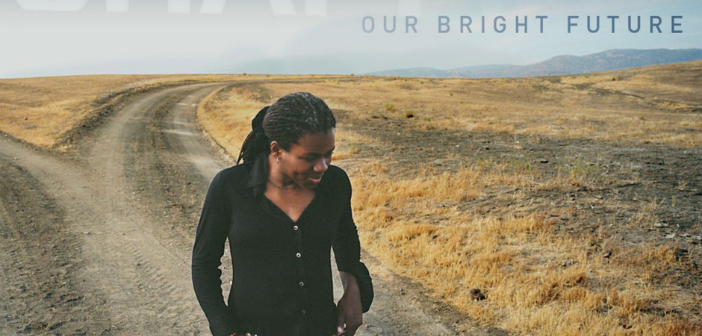THE TOUR
Lilith Fair was a concert tour and traveling music festival, founded by musician Sarah McLachlan, that consisted solely of female solo artists and female-led bands, emerging and developing talent as well as established artists. It lasted 3 years, from 1997 to 1999. Tracy Chapman was part of the very first tour in 1997. Check official website LilithFair.com
ITINERARY
In bold dates with Tracy Chapman on the bill
July 05, 1997 – George, WA – The Gorge Amphitheatre (setlist)
July 06, 1997 – Salem, OR – L.B. Day Amphitheatre
July 08, 1997 – Mountain View, CA – Shoreline Amphitheatre (setlist)
July 09, 1997 – Irvine, CA – Irvine Meadows Amphitheatre (setlist)
July 10, 1997 – Phoenix, AZ – Desert Sky
July 12, 1997 – Winter Park, CO – Winter Park Music Fest
July 14, 1997 – Bonner Springs, KS – Sandstone Amphitheatre
July 15, 1997 – St. Louis, MO – Riverport Amphitheatre
July 17, 1997 – Cuyahoga Falls, OH – Blossom –
July 18, 1997 – Clarkston, MI – Pine Knob
July 19, 1997 – Clarkston, MI – Pine Knob
July 20, 1997 – Canandaigua, NY – Finger Lake Performing Arts Centre (setlist)
July 22, 1997 – Mansfield, MA – Great Woods (setlist)
July 24, 1997 – Hartford, CT – Meadows Music Theatre
July 25, 1997 – Wantagh, NY – Jones Beach Amphitheatre (setlist)
July 26, 1997 – Holmdel, NJ – PNC Bank Arts Centre
July 27, 1997 – Camden, NJ – Blockbuster Centre (setlist)
July 29, 1997 – Columbia, MD – Merriweather Post
July 30, 1997 – Raleigh, NC – Walnut Creek
July 31, 1997 – Charlotte, NC – Blockbuster
August 01, 1997 – Atlanta, GA – Lakewood Amphitheatre
August 03, 1997 – Houston, TX – Woodlands
August 04, 1997 – Dallas, TX – Starplex
August 06, 1997 – Nashville, TN – Starwood Amphitheatre
August 07, 1997 – Cincinnati, OH – Riverbend
August 08, 1997 – Noblesville, IN – Deer Creek
August 09, 1997 – Tinley Park, IL – World Music
August 10, 1997 – Columbus, OH – Polaris Amphitheatre
August 12, 1997 – Burgettstown, PA – Starlake
August 13, 1997 – Scranton, PA – Montage Mountain
August 15, 1997 -Toronto, ON – Molson Amphitheatre
August 16, 1997 – Toronto, ON – Molson Amphitheatre
August 17, 1997 – Montreal, PQ – Stade DuMaurier
August 19, 1997 – Milwaukee, WI – Marcus Amphitheatre
August 20, 1997 – Shakopee, MN – Canterbury Park
August 22, 1997 – Calgary, AB – McMahon Stadium
August 24, 1997 – Vancouver, BC – Thunderbird Stadium
TRACY CHAPMAN SETLISTS
July 05, 1997 – George, WA – The Gorge Amphitheatre
01. Behind The Wall
02. New Beginning
03. Baby Can I Hold You
04. Remember The Tinman
05. Fast Car
06. Why?
07. Tell It Like It Is
08. Give Me One Reason
09. Talkin’ Bout A Revolution
July 08, 1997 – Mountain View, CA – Shoreline Amphitheatre
01. Behind The Wall
02. New Beginning
03. For My Lover
04. The Promise
05. Fast Car
06. Why?
07. Tell It Like It Is
08. Give Me One Reason
09. Talkin’ Bout A Revolution
10. New Beginning
July 09, 1997 – Irvine, CA – Irvine Meadows Amphitheatre
01. Behind The Wall
02. New Beginning
03. Baby Can I Hold You
04. The Promise > Save A Place For Me
05. Fast Car
06. Why?
07. Tell It Like It Is
08. Give Me One Reason
09. Talkin’ Bout A Revolution
July 20, 1997 – Canandaigua, NY – Finger Lake Performing Arts Centre
01. Behind The Wall
02. New Beginning
03. Baby Can I Hold You
04. The Promise
05. Fast Car
06. Why?
07. Tell It Like It Is
08. Give Me One Reason
09. Talkin’ Bout A Revolution
July 22, 1997 – Mansfield, MA – Great Woods
01. Behind The Wall
02. New Beginning
03. Baby Can I Hold You
04. The Promise > Save A Place For Me
05. Fast Car
06. Why?
07. Take Me To The River
08. Give Me One Reason
09. Talkin’ Bout A Revolution
July 24, 1997 – Hartford, CT – Meadows Music Theatre
01. Behind The Wall
02. New Beginning
03. Baby Can I Hold You
04. At This Point In My Life
05. Crossroads
06. The Promise >Save A Place For Me
07. Fast Car
08. Why?
09. Tell It Like It Is
10. Give Me One Reason
11. Talkin’ Bout A Revolution
July 27, 1997 – Camden, NJ – Blockbuster Centre
01. Behind The Wall
02. New Beginning
03. Baby Can I Hold You
04. The Promise >Save A Place For Me
05. Fast Car
06. Why?
07. Proud Mary
08. Give Me One Reason
09. Talkin’ Bout A Revolution
ARTICLE & REVIEWS
By: Women For: Everyone,
By Alison Powel, Interview, July 1997
Sarah McLachlan and Tracy Chapman take their hammers to the knotty question: Why a women’s festival?
When Lollapalooza, H.O.R.D.E., Skoal, and other summer music tours started turning into macho mosh pits. lyrical Canadian musician Sarah McLachlan felt it was time for an alternative to the so-called alternative. Her brainchild, the Lilith Fair, which begins this month, is an all-female affair of good music and good vibes. It is not, however, a travelling girl’s ghetto. Since we live in a time when pop democracy makes it possible for both sexes to create music that is either tremendous or horrendous, gathering the best women naturally also meant netting many of the most important performers, period. The lineup so far: Sarah McLachlan, Jewel, Tracy Chapman, Fiona Apple, the Cardigans, the Indigo Girls, Suzanne Vega, Paula Cole, Mary Chapin Carpenter, Shawn Colvin, Sheryl Crow, Joan Osborne, and Emmylou Harris. Here concert organizer McLachlan talks from Vancouver with one of Lilith’s troubadours, Tracy Chapman, who is in New York City a couple of months before the fair’s opening date. Though they speak across a three-hour time difference, it feels like early morning to both of them. Interview’s Alison Powell places the wake-up call.
SARAH MCLACHLAN: Tracy! How are you doing?
TRACY CHAPMAN: Oh, pretty good.
SM: So, what’s going on for you this week?
TC: Well, I’m in New York recording, and I’ve been doing a lot of traveling lately. What about you?
SM: I’ve been in the studio working on my new record.
TC: Oh,great!
SM: We’re almost done, and I had a wedding reception – mine – to come home to this week.
TC: Congratulations! When does your record come out?
SM: If all goes well, around the fifteenth of July. And then of course there’s the Lilith tour. You know, I haven’t been this excited in a long time. I’m so happy you said yes to coming along.
TC: Well, it sounded like such a great Idea when you mentioned it to me.
ALISON POWELL: When was that?
SM: I met Tracy for the lust time at Christmas. I’m pretty shy, but I just bowled into her dressing room and said. “Hey, how ya doin’? What’re you up to this summer?”
TC: You didn’t seem shy at alii
SM: I think I kind of freaked you out. I’m sorry, I was a little over the top. I was nervous to talk to you ’cause I’m no good at selling myself. Gosh, it’s so bloody early in the morning.
TC: How early is it for you?
SM: It’s nine.
TC: That is early. It’s noon for me In New York, and even that seems early.
AP: How about this for a wake-up question: If the established tours, like Lollapalooza and H.O.R.D.E, hadn’t become so masculine in recent times, do you still think there would be a Lilith?
SM: Oh, definitely. Lilith Fair was only slightly begun for reactionary masons. I think it’s been coming for a long time. In fact it’s odd to have to put this out as something new and different – Tracy, I think you’ll understand this. People ask, “So what do you think about this new fad of women in music?” And I think, What do you mean, fad? Have women never made music before?
AP: I think what people noticed was that there were suddenly a lot of women clustered at the top of the charts.
TC: The chart position Is what makes R.
AP: Tracy, you were a part of that.
TC: Yeah. But I think I know where Sarah was going with what she was saying. Of course women throughout history have always been making music, and crossing genres too, but it’s only in recent years that the press has made it seem as if these movements are moments in time when women are somehow becoming more popular, or in some cases dominating the Industry, which of course is far from the reality. But there are more opportunities out there right now for women who write their own songs and play on their own records.
SM: Yeah. If we had tried to put together a women’s music festival like this five years ago, the promoters would’ve laughed at us. Now they’re so excited about all these women – it’s nice to see that some things can turn around quite quickly. Who knows why? I guess people just had a desire to hear something different, and women were offering it.
AP: But Sarah, that was hardly still the early days of the women’s movement.
SM: Which is pretty sad.
TC: Yes, but even though I think all women owe something to the women’s movement – the right to vote, to own property, and to have control over our bodies and lives – the music made by the women who are part of this tour doesn’t necessarily have anything to do with politics. The position we are in also has a lot to do with the pace of music – a lot has happened In It.
SM: The curious thing about all this is that the idea for Lilith came from a humble idea, which was: Wow, wouldn’t it be fun to get together with a bunch of women I love and admire and have a tour? I never get to see anybody play live, so it’s really a selfish act.
TC: I was thinking that too. I haven’t seen a lot of the women who’ll be playing on the tour. It reminds me of when I did the Amnesty International shows. I’d never seen Pater Gabriel or Bruce Springsteen or Sting play live, so as much as I was a participant I also felt like a fan, and I feel the same way about Lilith: It’s a free concert every night.
SM: Yeah, that’s the prime motivator for me. Then along came all these huge feminist undercurrents, which of course are going to exist. But like Tracy said, the important thing to focus on is the incredible diversity of music that’s happening.
AP: Do you think Lilith Fair will test how well people can set aside their views on how what’s happening onstage is related to sex?
SM: Well, women are women.
TC: You can’t completely Ignore it.
SM: That’s a huge part of who we are.
TC: Right, and what we write about.
SM: That’s our perspective.
TC: And how we’re positioned In the music industry.
SM: And the world. I appreciate what you said, Tracy, about the fact that this didn’t start five or ten years ago. A lot of young women today don’t realize that eighty years ago we couldn’t vote. We’ve got it relatively easy compared to back then, so we really have to pay homage to those women, and remember them in all of this too.
AP: There’s also a generation of women who didn’t go to high school at a time when it was considered rebellious to pick up a guitar. There are different role models now.
SM: I had Pat Benatar.
TC: Right, and Joan Jett, those were the rockers. And Chrissie Hynde Is from Ohio, like me. There’s Heart, too, and Patti Smith and Blondie. Women were definitely out there being successful. So maybe, like you were saying, the only reason why women seem to be so strong now is the chart positions and the number of women artists being played on the radio.
SM: When we’re talking about Lilith, most interviewers ask, “Why do you think there are so many women happening now?”
TC: That’s why I would say we’re just talking about music and what people want. Audiences listen to the radio stations that play the records they like. it’s not about whether it’s a woman or a man singing. It’s Just a matter of “Hey, I like that song.”
SM: Exactly. It’s not that women have completely dominated the charts. I hate to use the word, but there’s a little more “equality” now.
TC: One thing I’ve never really liked is categorizing “women’s music,” or even “women’s culture.” I think there’s so much diversity In the world that even if you’re talking about people who have some commonality, a term like that can never fully describe what something or someone is. So I think in the case of Lilith Fair, the only real link is that we’re all musicians.
AP: I would guess the women on the bill are people who would hate to be lumped together just because they’re women. How have you dealt with that?
SM: I just love women. It just so happens that a lot of the songwriters and performers and musicians I like right now are women – and again, the tour was put together for selfish reasons. I never get to see anybody play live because I’m always on the road. And yeah, I think women deserve to be celebrated; I think people in general deserve to be celebrated. “I’m a humanist before I’m a feminist, or anything else” – that quote came from the first press release for Lilith, which my promotion company strongly recommended I do because they were afraid it was going to turn into this big hard-core feminist rally. That’s the last thing I want. I love men, I love people, and I don’t think this is about excluding anybody – it’s simply a celebration. We probably should have just said it was a celebration of music. But of course, you know, we are women.
TC: The other thing, and I’m not trying to speak for you, Sarah –
SM: Oh, please help!
TC: I just think you’re right. There’s nothing wrong with celebration of any kind, and certainly nothing wrong with celebrating women. I think it’s worth pointing out that often women are not celebrated in this culture. And they aren’t celebrated in the music industry. Truthfully, women are treated differently than men are, and it makes sense to bring a positive force into our representation and to be active participants in It. I mean it’s great that you did that press release, that you had an opportunity to explain your reasons for putting the tour together –
SM: Before all the misconceptions came.
TC: Right, and I think the tour Itself can do the same thing, We as women will get an opportunity to provide more Information to people about who we are, and to explain and describe ourselves instead of being explained and described by other people, who often misinterpret us.
SM: Songwriting is a big part of what we give to the world. I don’t know about you, Tracy, but that too is a selfish act on my part.
TC: Oh, completely. [laughs]
SM: It’s pretty much therapy, and then once I feel good about what I’ve made, it’s a gift to everybody else – the gift of myself. I’m writing from a human perspective, but I’m writing from a woman’s perspective as well.
TC: I understand you, and to follow up on what I was talking about Just a few minutes ago, I tried to do something I thought would be beneficial not only to myself but also to the whole musical process I was Involved In, and that was to ore, ate opportunities for people In my touring bend and in my craw. That meant opening up the selection process not only to women, but to people of color and younger people who might not have a lot of experience but who have a lot of energy and bring a lot of passion to their work. Those are Important actions to take, because it’s a way to respond to a word that doesn’t always create opportunities for people like them.
Anyway, given the ticket sales for this event, It seems there’s a let of Interest in seeing all these different women together on one stage at the same place and time. That’s not to say there aren’t great men out there, or that they couldn’t be on the stage with all of us at some point In time. It’s Just that this is, once again, a way to represent ourselves and to do so in a positive way.
AP: Do you expect to have a lot of men in the audience?
TC: Well, I always have men at my concerts. I mean I get all different kinds of people, so I’m assuming It’ll be the same on this tour.
SM: I think so too. We did sort of a trial run last year of four shows, and it was the same audience I usually get: lots of men, lots of women, very varied in age and everything. And as Tracy was saying, about being able to give something back and trying to change the system from within: One of the things we want to do is showcase young artists, so there’ll be a B stage as well. The reason I’ve been successful is not because of radio stations playing my songs, but because I got out there and played and played and played live, for two or three years at a time. If you’re good live, people are going to get into you and want to buy your record. So it’s a bit like getting played on the radio, only better.
AP: How will you decide who’s performing when? For example, who goes last?
SM: Well, personally, I don’t like going on last, so I hope it’s not me! Tracy, are you going on last?
TC: Am I? No!
SM: I don’t want to go on last either! I like going on second to last
TC: I like that spot as well. But Sarah, people might expect you to go on last because It’s your idea and your show.
AP: Well, at Live Aid, Bob Geldof went on like fifth.
SM: There’s only five acts in each Lilith Fair show.
TC: Right, SO Sarah can go on fifth.
AP: But that’s last –
TC: Shhh! We don’t need to say that.
SM: Oh, it’ll be great. I can’t wait. I want to get on the road right now. Tracy, take care, and we’ll see you in a couple months. Don’t work too hard.
TC: You too. Bye!
Lilith Fair at the Shoreline Amphitheater…,
– By Michelle Goldberg, Salon.com, July 11, 1997
A large, homely girl stood in the small crowd that surrounded poet-singer Kinnie Starr after her Lilith Fair performance Tuesday night, clutching a T-shirt with a picture of a ’50s-style blond bombshell and the words, “Beauty is Not Power,” and “Most Politicians Still Think a Woman Should Be Seen and Not Heard.” Suzanne Vega was starting on the main stage of the Shoreline Amphitheater just south of San Francisco, and most of the crowd was rushing to catch the beginning of her set. But the women who surrounded Starr didn’t move. Instead, they gave her gifts — one girl pressed a nectarine into Starr’s palm, promising it was organic. When the big girl’s turn came, she was beaming. “I just love this shirt,” she said, handing it to Starr to sign. “Especially the part that says, ‘Beauty is Not Power.'”
The show on the main stage, where Lilith Fair founder Sarah McLachlan performed along with Vega, Paula Cole, Jewel and Tracy Chapman, wasn’t much different from any big-ticket festival — everyone played abbreviated sets, and the cumulative effect was at times numbing and exhausting. But Lilith felt different from other festivals. While the difference was subtle — there was no touchy-feely granola vibe like at the Michigan Womyn’s Festival — the mood was so easy and comfortable that it occurred to me: this is probably how boys feel at shows all the time.
No one was putting on makeup in the women’s bathrooms (one of which, judging from the long row of urinals, had been converted from a men’s bathroom for the occasion). No one was trying to save their hair from the heat, probably because there were no roving gangs of hacky-sac playing thugs to impress. I was looking forward to making my way to the front of the crowd without being shoved aside by 6-foot punks, crushed by hairy ogres and slammed in the face by army boots on flailing crowd surfers. But unfortunately, the whole front of the amphitheater was reserved seating — disappointing, especially since half the joy of seeing Sarah McLachlan, the tour’s founder and headliner, is being up front to watch the worshipful tears in the eyes of her fans.
“Concerts are sometimes so aggressive,” said Yesenia Sanchez, a 24-year-old with long black hair who was sitting cross-legged on the lawn with her friend Tina. “Here there’s a different energy. The music is much more thoughtful, and it connects with people on a deeper level.”
Indeed, most of the artists were thrilled to be playing to so many girls. “I finally get to play for my peers, all the girls who can’t get into the bars where I usually play” said 19-year-old singer Lauren Hoffman. “Usually I go into the bar and it’s a five-boy band, and then me, and then another five-boy band.” Later, Hoffman seemed delighted to be signing autographs for fans her own age. The way her face lit up, it looked like she was the one meeting her idol.
The Lilith Fair is a world away from the boys-to-the-back anger of the riot grrrls, and Sarah McLachlan actually expressed disappointment that more men weren’t showing up. “I’m up on stage and I started counting,” she said. “It’s like four women, then one guy, then five more women.” In fact, McLachlan said, next year there will be men performing in the Lilith Fair. “This year a point needed to be made. There’s almost a reverse sexism against a lot of guys right now. These introspective singer-songwriter men are being marginalized like we were a few years ago.” She’s even charitable to the promoters who booked the cock-rock Lollapalooza lineup. “Let’s give them the benefit of the doubt. Maybe the women didn’t want to do it. Personally, if I saw Metallica on a bill, I’d say no.”
Not that there wasn’t any righteous indignation fueling the Lilith Fair. The idea for an all women mega-tour was born in 1995, when McLachlan toured with Paula Cole and some promoters balked at having two women on the same bill. “What?” asked McLachlan, “Are you afraid people won’t come?” Now McLachlan’s put 53 female artists on the same bill (in a rotating line-up that changes by region) and all of the shows so far have sold out. McLachlan hopes it will prove, once and for all, that women rockers aren’t just a trend, that “this is way too huge to be just a fad.”
Carla DeSantis, who as editor and publisher of ROCKRGRL magazine is following the fair across the country, said she’s tired of the way the media constantly recycles the story about the “trend” of female artists. “I came through the ranks as a professional musician,” said DeSantis. “I started the magazine because I had taken a break to get married and have a child, and I couldn’t believe that when I came back people were still making a big deal about girls playing music!
“I think this show proves the point I’ve been trying to make all along,” DeSantis said. “Obviously, people aren’t here to see a freak show. They’re here to see talented entertainers. This summer there’s more of a demand for Lilith than for any other festival.”
But has the demand come at the price of making the festival too mainstream and non-threatening? After all, these angel-faced folk singers are hardly subversive. “I’ve heard criticism from some in the media that it’s not diverse enough,” DeSantis said, “that Sarah could have gotten Sleater-Kinney or Seven Year Bitch. But these artists really reflect [McLachlan’s] taste and her audience.”
As tame as the acts on the main stage were, there was a coherence to the show that many music festivals lack. Lollapalooza, which keeps coming up whenever anyone starts talking about Lilith, can be so stylistically scattered that the fans split as soon as “their” band stops playing. But most of the artists on the Lilith tour share an audience. The women sitting around me seemed to know the words to all of the songs. When Tracy Chapman sang “Fast Car,” the whole audience was enthralled, and their unified attention seemed to make the song even more soulful and tragic.
That’s not to say that some of the artists on the main stage weren’t awful. Paula Cole was absurd singing her horrible hit, “Where Have All the Cowboys Gone,” with its dead-earnest lines, “I will do the laundry/If you pay all the bills.” It sounded especially ridiculous given the crowd around me — on one side was a husky bald dyke with rainbow rings and a “Girls Kick Ass” T-shirt, and on the other was a tall, pretty woman whose shirt read, “Everything I Know I Learned From My Girlfriend.”
Similarly, while Jewel’s stage patter was disarming, her song “Pieces of You,” is just so shockingly bad that it overshadows all her humble appeal. “I never thought I’d sell this many records,” she said, thanking her fans. “I really love what I do for a living and I’m really glad I don’t have to waitress anymore.” The crowd, many of whom were surely waitresses themselves, cheered wildly. Her first few songs were twangy and effervescent. But then she started singing “Pieces of You,” an embarrassingly banal song about discrimination. Her face was magnified on the screen above the stage, her doe eyes shut sensitively as she sang the worst lines I’ve ever heard in any song ever: “faaagooottt, faaaaaagooot” and “Ohhh Jeeeewwww, Ohhhh Jeeewwww.”
It was on the tiny third stage — a black box barely big enough for a singer, drummer and guitarist — that Kinnie Starr, the true gem of the festival, burned through her way-too-short set. There’s nothing more awful than bad poetry, which is why it takes someone like Starr to demonstrate how hypnotically musical spoken-word can be. “Lilith was banned from the garden of man, but she’s back and in our face, wings stretched far as she can,” Starr chanted in beatniky rhythm. The one song she did sing, before the start of Vega’s set cut her short, was “Grandma’s Bicycle,” and it was the most captivating of any performance. “I am through with this whole damn world and its overwhelming bad taste,” went the refrain, over and over in a smoky monotone.
“Most festivals are all men,” said Starr, who has only been performing for a year and a half. “I’ve tried to get into so many of them and have been turned down.” During her set, she pointed to two little girls in the audience and asked, “Do you two play guitar? Why not? Do you want to play my guitar?” They waited with their mother to meet her when she was finished, and Starr’s friend gave them stickers. Starr said she’s been thinking about being a role model a lot lately. “I never had that — I mean, besides Janis Joplin. This is really, really good for all the little girls. I hope all the little girls go home and beg their moms for guitars.”
July 11, 1997
Backtage at Lilith
– By Lorraine Ali, RS # 768 September 4, 1997
Women artists including Sarah McLachlan, Jewel and Paula Cole gather for the summer’s most successful festival
We’re sitting in a traffic jam behind a VW van smothered with Deadhead stickers on a dirt road outside the Gorge Amphitheater, 141 miles east of Seattle in a Godforsaken place called George, Wash. It can only be described as a moldy desert dotted with a few agricultural fields and irrigation machines that resemble fragile dinosaur skeletons. Photographer Merri Cyr and i are on a mission: We will follow the Lilith Fair tour for its first five days, traveling like its artists do, down the West Coast in tour buses; planes and automobiles; then we’ll disembark before it moves inward to spread its womanly goodness across the nation.
The fair is a 37-date extravaganza featuring a rotating roster of 64 female artists, among them Sheryl Crow, Shwn Colvin, Mary Chapin Carpenter, the Indigo Girls and Joan Osborne (Sarah McLachlan is the only constant performer). It’s the summer’s most popular, outselling Lollapalooza and H.O.R.D.E. It’s also a statement by its creator, the Canadian singer/songwriter McLachlan, that sisters, most of whom play a wafty blend of coffeehouse folk, are doin’it for themselves. “Three years ago, promoters were really afraid to put two women on the same bill”, said Mclachlan in an interview. “With Lilith, we just wanted to prove that the concept can be done.” They‘ve succeeded. Hugely. Lilith has sold out large venues across the country and is projected to sell more than a half-million tickets ($1 from each ticket goes to women’s charities). It has also raised the monetary consciousness of record moguls across the board by proving that an all-female tour can be viable, profitable and well-reviewed. There are already plans for Lilith ’98.
On this leg of the tour, the main stage features Suzanne Vega, then Paula Cole, Jewel, Tracy Chapman and McLachlan. The festivities will begin at 5:50 p.m. on the dot, after lesser-known artists do their thing on two smaller stages. But by 2:30, women are already pouring into the venue, which is perched on the side of a beauteous gorge carved by the Columbia River.
“I’m glad to see some men out there,” says McLachlan during a special acoustic set that will kick off Lilith Fair. She is on the smallest of the three stages as the Borders Stage and sponsored by the bookstore chain. McLachlan, barefoot and standing next to a carefully placed bouquet of wildflowers, strums her guitar and lilts lyrics, her gauzy red shirt and apricot-tinged hair blowing in the breeze. The predominantly female audience –clad in bathing-suit tops, cutoff shorts and flowing hippie garb that exposes primitive-goddess tatoos of suns, moons and stars looks transfixed.
Lilith is as safe and nonoffensive as it gets. No one shows up drunk or shags groupies backstage (“There aren’t any on this tour”, says Cassandra Wilson. “At least not on my bus”). No one gets held up at airports for smuggling drugs in body crevices, and no one trashes a hotel room. Compared with Lollapalooza, H.O.R.D.E and Warped, the Lilith Fair is this summer’s tour equivalent to Glinda the Good Witch. Even the crowd members are well-behaved, apologizing when they bump into one another, drinking bottled water rather than beer and swaying in seats rather that starting up a mosh pit.
There’s no Courtney Love brawling with members of Bikini Kill, no Salt-n-Pepa professing their need to shoop, no Liz Phair singing “Fuck and Run”. Lilith’s press release calls it “a reflection of women’s evolving role in popular music,” but as a wide range of people on the tour admits, it’s too one-dimensional, there’s nothing too risky or nongodesslike. Instead, women are represented as a whole by Jewel singing “You Were Meant For Me”, Tracy Chapman, performing with a didgeridoo and Mclachlan herself headlining all 37 night with a set that can be described as squeezably soft. It’s all smiles and serenity.
“I don’t remember who’s playing, but i came out to celebrate women in music,” says one cnocert-goer at the Shoreline Amphitheater, just outside San Francisco. “There’s been a boys’ club for long enough –now it’s timefor us to start our own.” I wonder whether everybosy has forgotten about the last 10 years in music, during which Hole, Björk, Alanis Morissette and TLC have eclipsed guys in the popularity and creativity departments.
But when you’re stepped in Lilithland, you can forget about the world outside and simply celebrate womanhood by purchasing free-flowing skirts in the Village area, dining at health-food stands with names like Wok on the Wild Side and standing in harmony woth other women in half-hour-long bathroom lines. Though the crowd is forced together as one, there’s little sisterly fraternizing backstage. Like high school society, a pecking order quickly forms: Suzanne Vega is the cool and distant art chick, Paula Cole the down-to-earth best friend, Jewel the stuck-up one, Tracy Chapman the respected activist and MacLachlan the peppy student-body president who wears weird-colored eye shadow. The second-stagers –Mudgirls, Leah Andreone and Cassandra Wilson – are like the stoners in the smoking area, possessing the coolest clothes, attitudes and tattooed backup dudes. The Borders Stage’s solo artists –Kinnie Starr and Lauren Hoffman – are the tag-along little sisters, still gawky, unpolished and apart from the social hierarchy.
Those extremes on the largest and smallest stages make the second stage the most interesting, with goofy punk-rock sets by Mudgirl (one of the few unsigned bands on the whole tour); weird, high-pitched Ani DiFranco yowls from Andreone; and a deadly cool set by jazz diva Wilson. When Vega starts up on the main stage, she does a spare set with just her bass player. It’s detached, arty and beautiful, and would have been devastatingly effective later in the evening. Her short set is a definite success with the audience, who get to sing do do do do’s of “Tom’s Diner”. Cole proves the most exhilarating – and sometimes ferocious- performer, shaking, dancing, whistling and making animal noises.
Then there’s Jewel’s set, during which she tells the audience how great it is not to be a waitress anymore. Meanwhile, a guy behind the mixing board in a shirt that reads, I LOVE THE SMELL OF DIESEL IN THE MORNING, keeps looking at his watch!; jewel’s backing band, an odd group that looks totally disconnected from her and one another, appears no more enthusiastic. Jewel attempts Patti Smith’s “Dancing Barefoot” all pouty and pigeon-toes, and sounds like, well, Jewel. The next four dates will consist of an unwitting game people play side-stage while Jewel performs. It’s called Is That a Cover or an Original ? “I think that’s Dylan’s ‘Tom Thumb’s Blues’,” comments another artist’s back-up musician. “But I think she just did another cover, of Blondie’s ‘Call Me’” says someone else. Meanwhile, I’m busy thinking how much her hit “You Were Meant For Me” sounds just like that sappy ‘70s hit “Danny’s Song” (“Even though we ain’t got money…”)
At this point I need ampage, screams, but Chapman comes out singing “Behind The Wall” a cappella, which echoes hauntingly across the stadium. Her set is spotless, perfect, supplemented by seven session musicians (A big problem here: most of the bands are precise yet robotic session guys, which results in little spontaneity on the main stage.) Chapman is a clear favorite with the fans and deservingly so, with a confident delivery and commanding presence.
Mclachlan comes next. A few more gauzy moments, and the show is over. Then begins my and Merri’s nightly scramble for a ride. Mclachlan, Jewel and Chapman send handlers to tell us we can’t go on their buses (Vega end Cole don’t have one yet), but Wilson offers to take us to Seattle. I wake the next morning in the Holiday Inn humming, “Tell me everything’s gonna be all right…”
According to Hebrew Folflore, Lilith was Adam’s first wife, but from there the stories vary, depending on just whom you talk to. Mclachlan says that Lilith didn’t want to take orders from Adam, so she dumped his ass. Kinnie Starr says that Lilith wasn’t subservient enough and was banished from the Garden of Eden. Even in the Old Testament, it’s unclear just what she did to cause such a stir. Isaiah 34:14 says, “Wild cats shall meet with desert beasts, satyrs shall call to one another; htere shall the Lilith repose and find for herself a place to rest.” Somehow it’s hard to imagine Jewel lying with desert beast in her red spaghetti-strap dress (“Herb Ritts gave it to me”), but at the Lilith Fair, we use our imaginations.
“What’s cool is, no one here acts like s star,” Jewel tells me in her dressing room on the San Francisco stop of the tour. “It doesn’t matter how many records you sell, even though I’ve sold the most”.
“WHEN MY ALBUM Fumbling Towards Ecstasy came out three years ago, a lot of radio stations said they couldn’t play the single because they had another woman, Tori Amos, on their playlists,” says Mclachlan at a press conference; these will take place every day for the first five days of the tour. “Like, ‘Go’way – we’ve alreday got our token female this week.’” Maybe the fact that there’s little air time allotted to women explains the underlying sense of competitiveness at these press events, which resemble the uncomfortable alliance of a NATO meeting. Answers are filled with the feminist-sounding words like empowerment, community and even germination, and the participants look as detached from one another as a seated row of subway riders. But at the press in Los Angeles, there is a moment of unification when a reporter asks why the lineup isn’t more diverse, with more rock and rap acts. McLachlan shoots back, “I think the lineup’s very diverse.” Andreone jumps in : “I’ve never seen so many different styles together.” Vega, Kim Bingham of Mudgirl and Kinnie Starr remain silent.
In Salem, ORE., we’re supposed to meet McLachlan for an interview, and we wait by her dressing room door for five minutes. When she opens it, she says with a grin, “You’re late –we have five less minutes now. I have to see Paula Cole play at 7:05, then from 7:30 to 8, I have to use my stair machine.” I feel so rushed, I ask stupid questions that result in answers with togetherness and community in them, and then go outside to watch Cole. There aren’t a lot of performers hanging out watching other’s sets, but when they do, they find, like it or not, Cole is the one supplying and stealing fire.
“There is a connectiveness with all the music on this bill,” says McLachlan at one point. “Just a vibe and energy. Everybody on this bill has a real gift of sharing”. But Bingham of Mudgirl, the only slightly punk-rock band on the tour, doesn’t exactly feel a oneness with the lineup today. “Our set was really disappointing,” she says, slamming her guitar case shut behind the second stage. You can hear Vega starting up on the main stage. “It’s like there were too many hippies out there, and they wanted something folkier. They just didn’t get it. I guess we were too rock & roll.” When I catch up with Vega, I ask whether she has been able to share with any of the artists. “I made an appointment to meet Tracy Chapman on Tuesday,” she says. Today is Saturday.
Lilith’s sponsors, all of whom have donated good amounts of money to women’s charities, are divided by McLachlan into such categories as spirit, shelter, learning and wellness (“Socially conscious business is what we wanted,” she says). Borders Books is in the learning category; Nine West Shoes in wellness (if you look good, you feel good).
I think of this earnestness as I share a plane ride from Salem to San Francisco with Paula Cole. She is dicussing how the artists have been talking to fans online at Microsoft booths. “One person asked me what I most wanted to take home from this experience, and I said, “Sarah’s underwear,” she says. “It went over like a lead balloon.” Remember, feminism is no joke. In the rare, uncomfortable interview I get with Chapman, all I want to do is break the Lilith seriousness with questions like, “What clothes do you bring on tour ?”
“I can’t believe I’m answering this,” Chapman says with a tinge of embarrassment. “I guess mostly all black stuff. It’s easier to match –like adult Garanimals.” Then she cracks a smile. “Is that it ?”.
Irvine Meadows, near Los Angeles, is the only venue that sports a cigar booth, a Mercedes-Benz giveaway and celebrities. Sharon Stone and Fran Dresher mill around backstage, while Matthew Perry dines in the catered area. Again, Chapman begins a cappella with “Behind The Wall”, and Stone bounces up toward side-stage like a teeny-bopper, as if to say, “Up with women!”
It is also in L.A that the veneer begins cracking. Word leaks out that Wilson is upset because she wasn’t asked to play main stage; another artist complains that McLachlan has been stealing her quotes to use at press conferences. When Bingham goes onstage, she announces, “I know you’re probably expecting something little folkier, but instead what you’re getting is ‘Sautée Onions’, then launches inti a power-punk number.
But as the show draws to a close, all is serene and calm, just like womanhood should be. McLachlan brings out her female dog, Rex, who sits on a Persian carpet; her husband, drummer Ashwin Sood, is by her side. Ad the band stands in a warm circle and performs McLachlan’s closing song, Rex lifts her leg, licks her crotch and falls asleep. And like the setting moon on a Celestial Seasoning box, Lilith is done for the evening.


